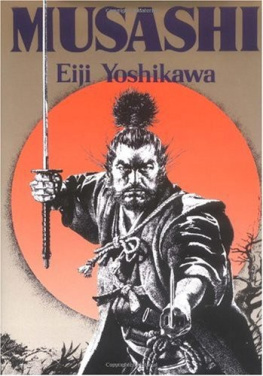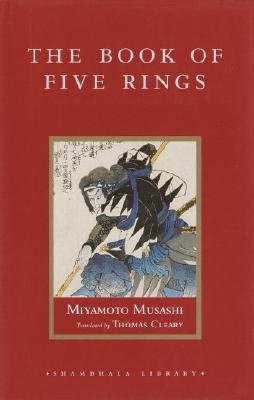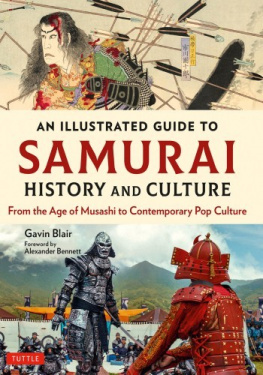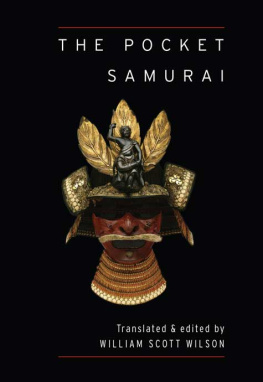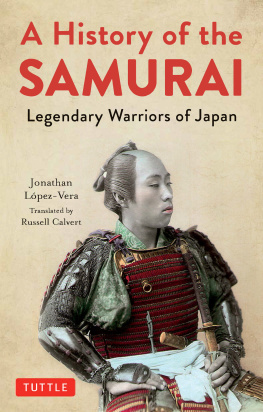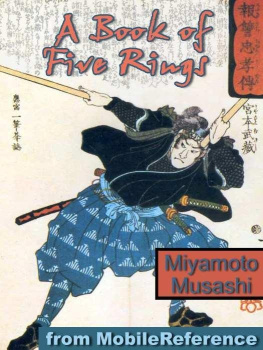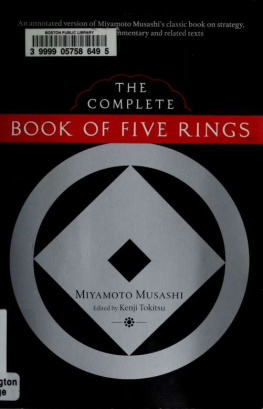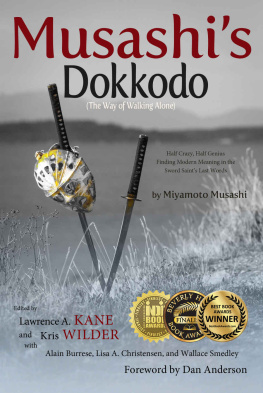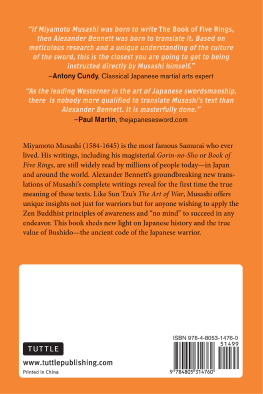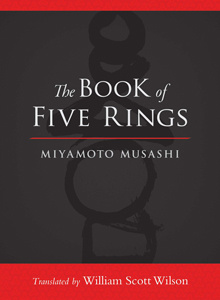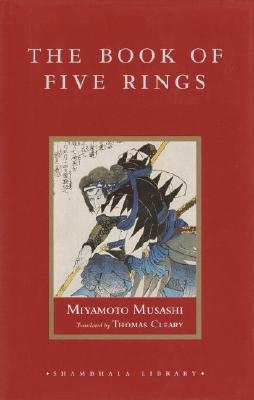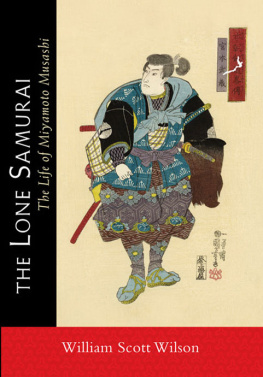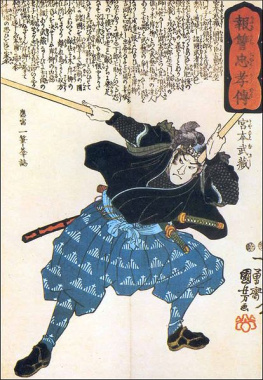MUSASHI
By Eiji Yoshikawa
Translated from the Japanese by Charles S. Terry
Foreword by Edwin O. Reischauer

Kodansha International
Tokyo New York London
Poem on page 477, from The Jade Mountain: A Chinese Anthology, translated by Witter Bynner from the texts of Kiang Kang-Hu, Copyright 1929 and renewed by Alfred A. Knopf, Inc. Reprinted by permission of the publisher.
Publication of this book was assisted by a grant from the Japan Foundation. First published in the Japanese language, Fumiko Yoshikawa 1971.
Distributed in the United States by Kodansha America, Inc., and in the United Kingdom and continental Europe by Kodansha Europe Ltd.
Published by Kodansha International Ltd., 17-14 Otowa 1-chome, Bunkyo-ku, Tokyo 1128652, and Kodansha America, Inc.
Copyright 1981 by Fumiko Yoshikawa. All rights reserved. Printed in Japan.
LCC 80-8791
ISBN-13: 978-4-7700-1957-8
ISBN-10: 4-7700-1957-2
First edition, 1981
First this edition, 1995
12 11 10 09 08 07 06 05 25 24 23 22 21 20 19 18 17 16 15
www.kodansha-intl.com
Contents
The Hzin
The Koyagy Fief
Jtars Revenge
Sasaki Kojir
Too Many Kojirs
Foreword
by Edwin O. Reischauer
Edwin O. Reischauer was born in Japan in 1910. He was a professor at Harvard University and was Professor Emeritus until his death in 1990. He was the United States Ambassador to Japan from 1961 to 1966, and was one of the best-known authorities on the country. Among his numerous works are Japan: The Story of a Nation and The Japanese.
Musashi might well be called the Gone with the Wind of Japan. Written by Eiji Yoshikawa (1892-1962), one of Japans most prolific and best-loved popular writers, it is a long historical novel, which first appeared in serialized form between 1935 and 1939 in the Asahi Shimbun, Japans largest and most prestigious newspaper. It has been published in book form no less than fourteen times, most recently in four volumes of the 53-volume complete works of Yoshikawa issued by Kodansha. It has been produced as a film some seven times, has been repeatedly presented on the stage, and has often been made into television mini-series on at least three nationwide networks.
Miyamoto Musashi was an actual historical person, but through Yoshikawas novel he and the other main characters of the book have become part of Japans living folklore. They are so familiar to the public that people will frequently be compared to them as personalities everyone knows. This gives the novel an added interest to the foreign reader. It not only provides a romanticized slice of Japanese history, but gives a view of how the Japanese see their past and themselves. But basically the novel will be enjoyed as a dashing tale of swashbuckling adventure and a subdued story of love, Japanese style.
Comparisons with James Clavells Shgun seem inevitable, because for most Americans today Shogun, as a book and a television mini-series, vies with samurai movies as their chief source of knowledge about Japans past. The two novels concern the same period of history. Shogun, which takes place in the year 1600, ends with Lord Toranaga, who is the historical Tokugawa Ieyasu, soon to be the Shgun, or military dictator of Japan, setting off for the fateful battle of Sekigahara. Yoshikawas story begins with the youthful Takez, later to be renamed Miyamoto Musashi, lying wounded among the corpses of the defeated army on that battlefield.
With the exception of Blackthorne, the historical Will Adams, Shgun deals largely with the great lords and ladies of Japan, who appear in thin disguise under names Clavell has devised for them. Musashi, while mentioning many great historical figures under their true names, tells about a broader range of Japanese and particularly about the rather extensive group who lived on the ill-defined borderline between the hereditary military aristocracy and the commonersthe peasants, tradesmen and artisans. Clavell freely distorts historical fact to fit his tale and inserts a Western-type love story that not only flagrantly flouts history but is quite unimaginable in the Japan of that time. Yoshikawa remains true to history or at least to historical tradition, and his love story, which runs as a background theme in minor scale throughout the book, is very authentically Japanese.
Yoshikawa, of course, has enriched his account with much imaginative detail. There are enough strange coincidences and deeds of derring-do to delight the heart of any lover of adventure stories. But he sticks faithfully to such facts of history as are known. Not only Musashi himself but many of the other people who figure prominently in the story are real historical individuals. For example, Takuan, who serves as a guiding light and mentor to the youthful Musashi, was a famous Zen monk, calligrapher, painter, poet and tea-master of the time, who became the youngest abbot of the Daitokuji in Kyoto in 1609 and later founded a major monastery in Edo, but is best remembered today for having left his name to a popular Japanese pickle.
The historical Miyamoto Musashi, who may have been born in 1584 and died in 1645, was like his father a master swordsman and became known for his use of two swords. He was an ardent cultivator of self-discipline as the key to martial skills and the author of a famous work on swordsmanship, the Gorin no sho . He probably took part as a youth in the battle of Sekigahara, and his clashes with the Yoshioka school of swordsmanship in Kyoto, the warrior monks of the Hzin in Nara and the famed swordsman Sasaki Kojir, all of which figure prominently in this book, actually did take place. Yoshikawas account of him ends in 1612, when he was still a young man of about 28, but subsequently he may have fought on the losing side at the siege of Osaka castle in 1614 and participated in 1637-38 in the annihilation of the Christian peasantry of Shimabara in the western island of Kyushu, an event which marked the extirpation of that religion from Japan for the next two centuries and helped seal Japan off from the rest of the world.
Ironically, Musashi in 1640 became a retainer of the Hosokawa lords of Kumamoto, who, when they had been the lords of Kumamoto, had been the patrons of his chief rival, Sasaki Kojir. The Hosokawas bring us back to Shgun, because it was the older Hosokawa, Tadaoki, who figures quite unjustifiably as one of the main villains of that novel, and it was Tadaokis exemplary Christian wife, Gracia, who is pictured without a shred of plausibility as Blackthornes great love, Mariko.
The time of Musashis life was a period of great transition in Japan. After a century of incessant warfare among petty daimy, or feudal lords, three successive leaders had finally reunified the country through conquest. Oda Nobunaga had started the process but, before completing it, had been killed by a treacherous vassal in 1582. His ablest general, Hideyoshi, risen from the rank of common foot soldier, completed the unification of the nation but died in 1598 before he could consolidate control in behalf of his infant heir. Hideyoshis strongest vassal, Tokugawa Ieyasu, a great daimy who ruled much of eastern Japan from his castle at Edo, the modern Tokyo, then won supremacy by defeating a coalition of western daimy at Sekigahara in 1600. Three years later he took the traditional title of Shgun, signifying his military dictatorship over the whole land, theoretically in behalf of the ancient but impotent imperial line in Kyoto. Ieyasu in 1605 transferred the position of Shgun to his son, Hidetada, but remained in actual control himself until he had destroyed the supporters of Hideyoshis heir in sieges of Osaka castle in 1614 and 1615.

